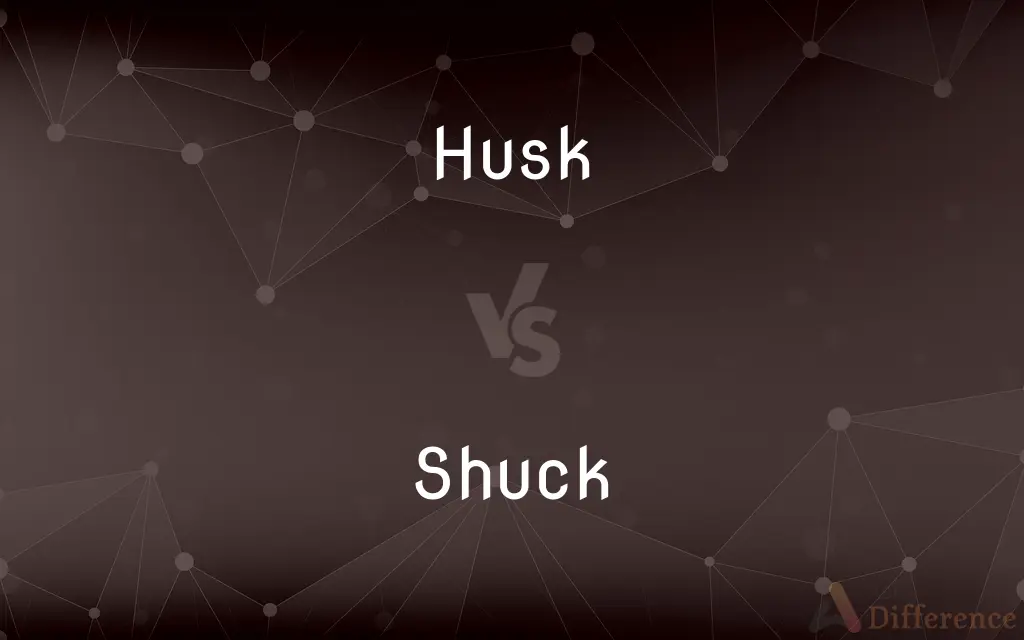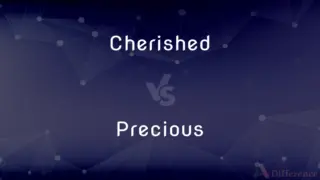Husk vs. Shuck — What's the Difference?
By Tayyaba Rehman & Urooj Arif — Updated on April 16, 2024
Husk is the outer protective covering of a seed or fruit, like a coconut, while shuck specifically refers to the outer shell of nuts or the husk of corn.

Difference Between Husk and Shuck
Table of Contents
ADVERTISEMENT
Key Differences
A husk generally refers to the dry, outer covering of various seeds and fruits which protects the inner edible parts, such as in coconuts and rice. Whereas, shuck is used more specifically to describe the casing or hull of certain seeds, particularly corn and nuts.
Husks are often tough and fibrous, serving as a barrier against physical damage and pests. On the other hand, shucks are usually easier to remove and are often associated with the act of shucking, like peeling off the layers of a corn cob.
In agricultural and culinary contexts, husks can be used as fodder, mulch, or even in crafting materials due to their durability. Whereas, shucks are typically discarded or composted, as they are seen primarily as waste.
The term "husk" is sometimes used in a more metaphorical sense to describe something that is empty or devoid of value, reflecting its role as a mere protector of something more valuable inside. In contrast, "shuck" does not commonly carry such connotations.
Some industries find innovative uses for husks in eco-friendly products, such as biodegradable pots and packaging. Shucks, while similar, are less frequently used in such innovations, primarily serving as organic waste.
ADVERTISEMENT
Comparison Chart
Definition
The outer covering of a seed or fruit.
The outer shell of nuts or corn husks.
Common Usage
Protective layer, sometimes used in crafts.
Often discarded or used for compost.
Removal Process
Can be tough and require effort to remove.
Generally easier to remove or peel off.
Metaphorical Use
Can imply something being hollow or empty.
Lacks metaphorical uses.
Environmental Use
Used in eco-friendly products.
Less commonly used in products.
Compare with Definitions
Husk
Something discarded during processing of food.
The corn husks were scattered across the field.
Shuck
The casing of corn kernels found on a cob.
He tossed the shuck into the trash after stripping the corn.
Husk
A shell that remains after the inner part has been used or removed.
Only the rice husk remained after milling.
Shuck
To remove the outer layer of food items.
We spent the evening shucking oysters.
Husk
Used metaphorically to refer to something empty or superficial.
He felt like a mere husk after years of tedious work.
Shuck
A term associated with the act of removing husks.
Shucking corn is easier when it's fresh.
Husk
Material used in environmentally sustainable products.
They manufactured biodegradable pots from rice husks.
Shuck
The outer covering of nuts, often removed before consumption.
The peanut shucks were all over the kitchen floor.
Husk
The rough external covering of certain fruits and seeds.
The husk of the coconut is hard to crack.
Shuck
Informally, to express discarding or getting rid of something.
She shucked her old habits when she started her new job.
Husk
Husk (or hull) in botany is the outer shell or coating of a seed. In the United States, the term husk often refers to the leafy outer covering of an ear of maize (corn) as it grows on the plant.
Shuck
A husk, pod, or shell of a seed, nut, or fruit, such as a pecan or an ear of corn.
Husk
The outer membranous or green envelope of some fruits or seeds, as that of a walnut or an ear of corn.
Shuck
A shell of a bivalve, such as an oyster or clam.
Husk
A shell or outer covering, especially when considered worthless.
Shuck
The exoskeleton or pupal case of an insect larva or nymph, especially one that has been shed.
Husk
A framework serving as a support.
Shuck
Often shucks(Informal) Something worthless
An issue that didn't amount to shucks.
Husk
To remove the husk from.
Shuck
To remove the husk or shell from
Shuck corn.
Husk
The dry, leafy or stringy exterior of certain vegetables or fruits, which must be removed before eating the meat inside.
A coconut has a very thick husk.
Shuck
To open the shell of (a bivalve)
Shuck oysters.
Husk
Any form of useless, dried-up, and subsequently worthless exterior of something.
His attorney was a dried-up husk of a man.
Shuck
(Informal) To cast off
Shucked their coats and cooled off.
A city trying to shuck a sooty image.
Husk
The supporting frame of a run of millstones.
Shuck
Used to express mild disappointment, disgust, or annoyance.
Husk
An infection in cattle caused by a species of Dictyocaulus or lungworm
Shuck
The shell or husk, especially of grains (e.g. corn/maize) or nuts (e.g. walnuts).
Husk
(transitive) To remove husks from.
Shuck
A fraud; a scam.
Husk
(intransitive) To cough, clear one's throat.
Shuck
(slang) A phony.
Husk
(transitive) To say huskily, to utter in a husky voice.
Shuck
(folklore) A supernatural and generally malevolent black dog in English folklore.
Husk
The external covering or envelope of certain fruits or seeds; glume; hull; rind; in the United States, especially applied to the covering of the ears of maize.
Shuck
(transitive) To remove the shuck from (walnuts, oysters, etc.).
Shall we shuck walnuts?
Husk
The supporting frame of a run of millstones.
Shuck
(transitive) To remove (any outer covering).
I will shuck my clothes and dive naked into the pool.
Husk
To strip off the external covering or envelope of; as, to husk Indian corn.
Shuck
To fool; to hoax.
Husk
Material consisting of seed coverings and small pieces of stem or leaves that have been separated from the seeds
Shuck
(dialectal) To shake; shiver.
Husk
Outer membranous covering of some fruits or seeds
Shuck
(dialectal) To slither or slip, move about, wriggle.
Husk
Remove the husks from;
Husk corn
Shuck
(dialectal) To do hurriedly or in a restless way.
Shuck
(dialectal) To avoid; baffle, outwit, shirk.
Shuck
To walk at a slow trot.
Shuck
A shock of grain.
Shuck
A shell, husk, or pod; especially, the outer covering of such nuts as the hickory nut, butternut, peanut, and chestnut.
Shuck
The shell of an oyster or clam.
Shuck
To deprive of the shucks or husks; as, to shuck walnuts, Indian corn, oysters, etc.
Shuck
To remove or take off (shucks); hence, to discard; to lay aside; - usually with off.
"Shucking" his coronet, after he had imbibed several draughts of fire water.
He had only been in Africa long enough to shuck off the notions he had acquired about the engineering of a west coast colony.
Shuck
Material consisting of seed coverings and small pieces of stem or leaves that have been separated from the seeds
Shuck
Remove from the shell;
Shuck oysters
Shuck
Remove the shucks from;
Shuck corn
Common Curiosities
Are shucks compostable?
Yes, shucks are compostable and contribute to organic waste used for composting.
What is a husk used for in agriculture?
In agriculture, husks are often used as fodder for animals or as mulch to enrich soil.
What does it mean to shuck corn?
To shuck corn means to remove its outer layers, revealing the kernels.
What is the difference between husk and shell?
A husk is the outer protective covering of a seed or fruit, which is often fibrous, while a shell is a harder, more rigid outer layer, typically seen in nuts and certain seafood like clams.
How are husks and shucks environmentally beneficial?
Husks and shucks are biodegradable and can be used as compost, adding organic matter to the soil, which helps improve soil health and fertility.
What materials are commonly referred to as shucks besides corn?
Besides corn, the term "shuck" is often used to refer to the outer coverings of various nuts, particularly peanuts and walnuts.
Can husks be recycled?
Yes, husks can be recycled and are used in making eco-friendly products like biodegradable containers.
Is there any nutritional value in husks or shucks?
Generally, husks and shucks have no nutritional value and are not consumed.
Is shucking always related to food?
While shucking is primarily associated with food, particularly in preparing seafood like oysters and clams, the term can also be informally used to describe the act of removing any outer layer.
Can husks be used in any industrial applications?
Yes, husks from rice, coconut, and other seeds are used in various industrial applications, including the production of biofuels, building materials, and even as a natural abrasive in industrial cleaning.
What are the environmental impacts of discarding husks and shucks improperly?
Improper disposal of husks and shucks, especially in large quantities, can lead to waste management issues and contribute to landfill overflow. Composting or recycling them is more environmentally friendly.
How do you properly dispose of shucks after use?
Shucks should ideally be composted as they are organic matter. They can be added to compost bins or used directly in gardens to improve soil structure.
Are there any cultural or traditional uses for husks?
Yes, in many cultures, husks are used traditionally for crafting items such as mats, baskets, and even as roofing materials in rural areas.
Share Your Discovery

Previous Comparison
Cute vs. Hot
Next Comparison
Cherished vs. PreciousAuthor Spotlight
Written by
Tayyaba RehmanTayyaba Rehman is a distinguished writer, currently serving as a primary contributor to askdifference.com. As a researcher in semantics and etymology, Tayyaba's passion for the complexity of languages and their distinctions has found a perfect home on the platform. Tayyaba delves into the intricacies of language, distinguishing between commonly confused words and phrases, thereby providing clarity for readers worldwide.
Co-written by
Urooj ArifUrooj is a skilled content writer at Ask Difference, known for her exceptional ability to simplify complex topics into engaging and informative content. With a passion for research and a flair for clear, concise writing, she consistently delivers articles that resonate with our diverse audience.
















































